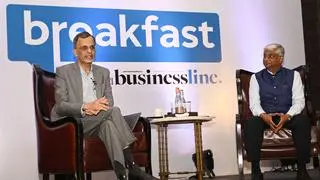The Revenue Department has a multi-pronged strategy to bring gains made from cryptos into the tax net in India. Besides significantly leveraging technology to track transactions, crypto exchanges domiciled in India will be required to share information on transacting users so that it corroborates them with the TDS data and information on the returns filed by taxpayers to maximise tax revenues.
Asserting that the Budget proposal on taxation of virtual digital assets was neither endorsing nor legitimising cryptos, Revenue Secretary Tarun Bajaj told BusinessLine that the budget proposal was only bringing “certainty as to how virtual digital assets will be taxed”.
“We will also seek information as to who all have traded on this so that we can keep a check. Players like crypto exchanges would be required to share information with the tax department. We also have TDS that will give us audit trail”, Bajaj said.
Betting big on technology
The department is betting big on technology to get itself armed to tax even transactions put through by Indians in crypto exchanges domiciled abroad. Bajaj underlined that tax department would use multiple tools including better information collection to connect the dots and see to it that profits made in crypto transactions don’t escape the tax net. Bajaj noted that although crypto gains are taxable even as on date, the level of disclosures by Indian tax payers on this front in their tax returns has been far from satisfactory. Indications are that income tax returns from next year will have separate columns for separate disclosure of crypto transactions and the gains made from it. This could help the income tax department in better revenue collections.
Union Budget on Tuesday proposed that income from transfer of virtual digital assets would be taxed at 30 per cent plus surcharge and cess. Virtual digital assets have been comprehensively defined in the Finance Bill so as to cover cryptos, non fungible token and any information, token or code that has been cryptographed and by whatever name called.
From July 1, 2022, the Finance Bill provides that 1 per cent tax deduction at source (TDS) will be applicable on the sum credited to a resident. The TDS will apply on the entire transacting value and a threshold of ₹ 50,000 has been specified for the transaction value beyond which TDS will apply, according to Bajaj. The budget had also proposed that neither deductions for income tax purposes will be allowed on the gains nor will losses arising from sale of virtual assets will be allowed to be set off against any other income.
Bajaj also said that revenue department has no internal target on the tax mop up that it is eyeing for 2022-23 from the virtual digital assets.
“Legal or illegal (cryptos) is something for you to interpret. We as revenue department would also not get into regulated or unregulated. As far as taxation is concerned, tax department does not go into this. You can do speculation or make profits of speculation on virtual digital assets, but you have to pay taxes on that”, he said.
In a separate interaction with BusinessLine on Wednesday, Economic Affairs Secretary Ajay Seth said that any fresh amendment to Foreign Exchange Management Act (FEMA) was not being contemplated even as the government proposed in Budget to bring virtual digital assets including cryptos to tax.
“ I don’t think any amendment to FEMA law or rules are required. FEMA rules are clear. An individual can take out only $ 2,50,000 in a year through LRS and invest overseas. Anybody buying crypto assets beyond this limit is breaking the law. He should get ready to be hauled up”, he said.
Seth said that overall stance on how to deal with crypto has not been taken by government. “We have moved only on the perspective of bringing such incomes to tax. The clarity has been given on taxation front. The budget neither endorses nor legitimises cryptos. Other than taxation, it remains unregulated. So all avenues in terms of policy response for a ban or otherwise— discussions are still on”, Seth said.









Comments
Comments have to be in English, and in full sentences. They cannot be abusive or personal. Please abide by our community guidelines for posting your comments.
We have migrated to a new commenting platform. If you are already a registered user of TheHindu Businessline and logged in, you may continue to engage with our articles. If you do not have an account please register and login to post comments. Users can access their older comments by logging into their accounts on Vuukle.